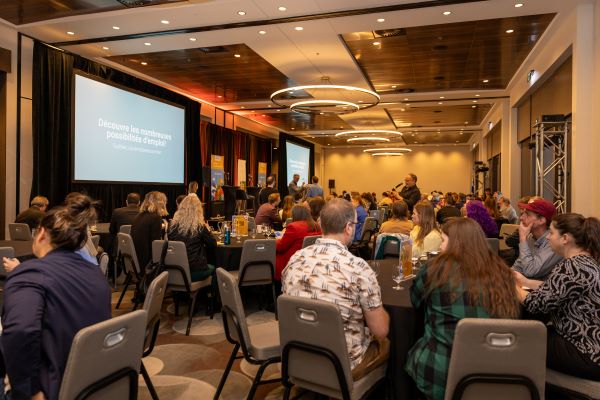The Symposium on Seasonal Employment (Chantier sur la saisonnalité) was held March 28 in the beautiful Quebec City region, at Lac-Beauport. Under the theme “Working with the seasons: HR innovations and solutions”, representatives from five business sectors—tourism, forestry, agriculture, fisheries, and horticulture—shared and discussed initiatives and best practices implemented to meet the many challenges posed by seasonal employment.
In collaboration with the Conseil québécois des ressources humaines en tourisme (CQRHT), Tourism HR Canada presented some best practices for recruiting and retaining a mixed workforce in tourism.
Isabelle de Bruyn, Tourism HR Canada Vice-President of Labour Market Intelligence, put forward a new approach to employee archetypes, designed to help employers identify the type of workforce they are looking for and outline the expectations of these individuals at different stages of their professional and personal lives. This approach was developed as part of research on global compensation and best practices for recruiting and retaining seasonal and permanent staff.



Dealing with Seasonality: A Reality for Many Sectors
Seasonality is not exclusive to the tourism sector: many other economic sectors, such as forestry and agriculture, by their very nature face similar challenges, sometimes at different levels (skills, provenance, multi-seasonality, etc.).
Quite often, Quebec tourist destinations are also agricultural regions or regions associated with fisheries. So why not try to mesh this seasonal workforce, whose scarcity and current transformation pose numerous challenges in terms of business management?
This is what the representatives of the Chantier sur la saisonnalité are trying to achieve through innovative initiatives and pilot projects, such as:
- Workforce-sharing platform (tourism)
- Network of seasonal jobs (tourism)
- Combined jobs (all five sectors)
- Group insurance program (agriculture)
- Agricultural recruitment and placement service, in the heart of Montreal (agriculture)
- Paid work-study Diploma of Vocational Studies (diplôme d’études professionnelles [DEP]) (horticulture)
- Continuing education activities during the off-season (horticulture)
- Study on the vision, needs, and expectations of manual forestry workers (forestry)
- International recruitment pilot project (fisheries)
Data on Seasonality: Well-Defined Realities Despite a Vague Concept
Tourism HR Canada’s research team also collaborated with the CQRHT team to develop a data fact sheet on seasonal employment in tourism in Quebec, designed to share with symposium participants the data available to help them understand the reality of this segment of the workforce.
One of the obstacles encountered in terms of research is the lack of consistency in the definition of seasonality. The concept of seasonality as applied to the tourism sector is not an exact science. The available data as collected by Statistics Canada in relation to tourism activity (tourism-related NAICS codes) and in relation to employment (National Occupational Classification – NOC) do not always refer to the same definitions of seasonality or of a seasonal position/job. As a result, the data is subject to certain limitations, which must be taken into account in the figures and graphs presented.
Despite these statistical distortions, a few key facts stand out:
- The summer seasonal peak relies mainly on employment in the accommodations industry, and to a lesser extent the recreation and entertainment industry.
- In Quebec, the biggest seasonal variation is in the 15–24 age group (+19%). (It is +11% for the 34–45 age group and +10% for the 65+ age group.)
- The variation in the number of hours worked for seasonal peaks in the tourism sector in Quebec is +12%. (Accommodations +50%, recreation and entertainment +22%.)
Data on seasonal employment by sector, as well as current presentations and initiatives, are available on the symposium website, in the documentation section (in French only).
The Chantier sur la saisonnalité is represented by:
HortiCompétences, AGRIcarrières, Comité sectoriel de main-d’oeuvre des pêches maritimes, ForêtCompétences, Conseil québécois des ressources humaines en tourisme

